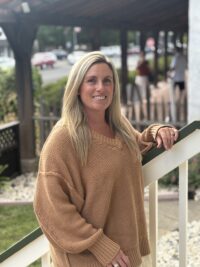Analyst for the UN World Food Project currently in Gaza and former professional soccer player who is an international advocate for equality for women in sports, the remarkable Erin Blankenship was visiting her sister Leslie Blankenship in El Verano when she talked with Anna Pier.

Education? Undergrad at Trinity University in San Antonio. It had my 4 S’s – sunshine, soccer, scholarship, and study abroad. I majored in International Affairs and Mandarin, and spent two years in China. Since then I have received an MA in International Peace and Security, and an MA in Conflict Security and Development, both from Kings College London. While I was studying, I played pro football for WestHam United FC and Crystal Palace FC.
Talk about your work to address inequality in women’s sports. I co-founded Equal Playing Field (EPF), with a friend. Our first Guinness World Record was to play a 90-minute FIFA regulation soccer game at the top of Mt. Kilimanjaro. Thirty-three players from 20 countries climbed up, carrying the goal posts and flour for marking the lines. Climb to the top of the world to prove you’re equal!
The next world record match was at the Dead Sea – the lowest spot on earth! We’ve set 5 world records for women in soccer as a way to demonstrate in the most obvious way possible the idea that women are equally as capable as men. We challenge gender inequality in and through sport from the grassroots to the elite levels. We inspire girls and women (and allies) to break free of the limitations imposed on them; anything is possible.
So far, EPF has supported camps and events for more than 8,500 girls and women from 72 countries. And we’ve held three high-level policy Equality Summits that have brought together 450 of the world’s leaders and changemakers in women’s football and sport.
Talk about the World Food Project. Currently the UN WFP has about 30K workers in 90 countries. WFP feeds nearly 150 million people each year. It is the logistical arm of the UN. I am a Conflict and Emergency Analyst. My job is to find out what’s going on, what is the context, who’s who, who’s safe to work with, who are the stakeholders, what is driving the vulnerability?
The focus is, of course, on food security in places in conflict. I help WFP understand where we can work. Of late I’ve been in Syria, Yemen, Iraq, Lebanon. Making sure we do no harm. I have spent the last four months between Gaza and the West Bank.
I have also been part of Emergency Response Teams, providing support in many countries – Ukraine, Moldova, Armenia, the Sudan border with Egypt, Turkey after the earthquake.
What do you like about your work? The main pro is that I’m never bored. There is great intellectual satisfaction over complex problem-solving. Trying to lessen the impact of bad things, I like working in this arena, to have the freedom to focus on values and international norms, as opposed to purely political interests, closer to principled action than to political agendas.
Can you talk about your current work in Gaza? Professionally, the work is the most acute manifestation of my skill set. But I got beat up this year, emotionally and psychologically. It is a catastrophic lack of food, and painfully obvious in the humanitarian community that starvation is a weapon of war. To meet the need, there should be 200 trucks a day, filled only with food. But at best there are only 80 trucks/day carrying everything. Some days and weeks the IDF allows no trucks through.
That is blatant disregard for international humanitarian law. This is a textbook definition of genocide. I have expectations of the power brokers, and they are failing us. We are failing at our fundamental humanitarian duties. And to date, 287 aid workers have been killed in Gaza – that’s more than in the entire history of humanitarian crises since the start of the UN.
What is a typical day for you in Gaza? Up by 6, I do catching up. At 8, briefing with my senior manager, about what is coming? Why? For example, trying to find alternate routes for food to enter since the Rafah crossing was closed. I talk with community leaders, or with NGOs. We are constantly coming up with strategies for divvying up the food that does get in, getting it to communities that face the most immediate, urgent needs. Or, more often, we are serving those we could reach safely under the day’s circumstances. And we have to do this in a way that will not generate safety and security risks for the communities, or the people we are working with on the ground, and would also not contribute to longer term sensitivity problems within and between communities in a context of such extreme desperation.
What are your coping strategies? To focus on smaller components of the problem, and to find allies in the process, embracing the human element, so that you’re not alone in this. As a nerd, I process my trauma through the intellectual side. And I take a lot of unpaid leave. I am uncompromising about the time off I need. And I quit every four or five years, and spend a lot of time with other people in my life, in other locations far away.
Interview by Anna Pier





Thank you for sharing Erin’s amazing story of inspiration, resilience and kindness.